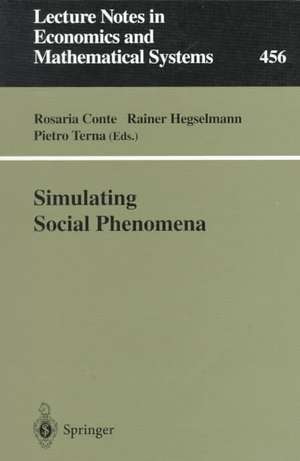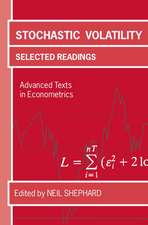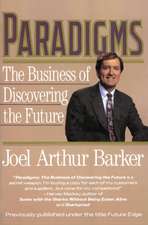Simulating Social Phenomena: Lecture Notes in Economics and Mathematical Systems, cartea 456
Editat de Rosaria Conte, Rainer Hegselmann, Pietro Ternaen Limba Engleză Paperback – 19 aug 1997
Din seria Lecture Notes in Economics and Mathematical Systems
-
 Preț: 360.02 lei
Preț: 360.02 lei -
 Preț: 383.93 lei
Preț: 383.93 lei -
 Preț: 384.09 lei
Preț: 384.09 lei -
 Preț: 380.07 lei
Preț: 380.07 lei -
 Preț: 446.26 lei
Preț: 446.26 lei -
 Preț: 497.37 lei
Preț: 497.37 lei -
 Preț: 380.84 lei
Preț: 380.84 lei -
 Preț: 384.86 lei
Preț: 384.86 lei -
 Preț: 378.34 lei
Preț: 378.34 lei -
 Preț: 399.67 lei
Preț: 399.67 lei - 20%
 Preț: 360.93 lei
Preț: 360.93 lei - 15%
 Preț: 643.16 lei
Preț: 643.16 lei -
 Preț: 379.09 lei
Preț: 379.09 lei -
 Preț: 404.74 lei
Preț: 404.74 lei -
 Preț: 385.62 lei
Preț: 385.62 lei - 15%
 Preț: 644.49 lei
Preț: 644.49 lei -
 Preț: 379.09 lei
Preț: 379.09 lei -
 Preț: 345.50 lei
Preț: 345.50 lei -
 Preț: 425.80 lei
Preț: 425.80 lei -
 Preț: 378.34 lei
Preț: 378.34 lei - 18%
 Preț: 775.65 lei
Preț: 775.65 lei -
 Preț: 392.60 lei
Preț: 392.60 lei -
 Preț: 401.61 lei
Preț: 401.61 lei - 15%
 Preț: 646.43 lei
Preț: 646.43 lei -
 Preț: 382.18 lei
Preț: 382.18 lei -
 Preț: 378.34 lei
Preț: 378.34 lei - 15%
 Preț: 637.59 lei
Preț: 637.59 lei - 15%
 Preț: 647.27 lei
Preț: 647.27 lei -
 Preț: 377.73 lei
Preț: 377.73 lei -
 Preț: 447.84 lei
Preț: 447.84 lei - 15%
 Preț: 644.49 lei
Preț: 644.49 lei -
 Preț: 386.00 lei
Preț: 386.00 lei - 15%
 Preț: 654.43 lei
Preț: 654.43 lei -
 Preț: 415.02 lei
Preț: 415.02 lei -
 Preț: 411.54 lei
Preț: 411.54 lei -
 Preț: 398.92 lei
Preț: 398.92 lei -
 Preț: 398.92 lei
Preț: 398.92 lei -
 Preț: 392.75 lei
Preț: 392.75 lei - 15%
 Preț: 635.47 lei
Preț: 635.47 lei - 20%
 Preț: 653.56 lei
Preț: 653.56 lei -
 Preț: 379.86 lei
Preț: 379.86 lei -
 Preț: 495.46 lei
Preț: 495.46 lei -
 Preț: 447.99 lei
Preț: 447.99 lei -
 Preț: 378.71 lei
Preț: 378.71 lei - 15%
 Preț: 637.13 lei
Preț: 637.13 lei -
 Preț: 385.84 lei
Preț: 385.84 lei -
 Preț: 378.54 lei
Preț: 378.54 lei - 15%
 Preț: 666.55 lei
Preț: 666.55 lei -
 Preț: 380.07 lei
Preț: 380.07 lei
Preț: 652.81 lei
Preț vechi: 768.01 lei
-15% Nou
Puncte Express: 979
Preț estimativ în valută:
124.91€ • 130.77$ • 103.36£
124.91€ • 130.77$ • 103.36£
Carte tipărită la comandă
Livrare economică 07-21 aprilie
Preluare comenzi: 021 569.72.76
Specificații
ISBN-13: 9783540633297
ISBN-10: 3540633294
Pagini: 548
Ilustrații: VIII, 536 p. 70 illus.
Dimensiuni: 155 x 235 x 29 mm
Greutate: 0.76 kg
Editura: Springer Berlin, Heidelberg
Colecția Springer
Seria Lecture Notes in Economics and Mathematical Systems
Locul publicării:Berlin, Heidelberg, Germany
ISBN-10: 3540633294
Pagini: 548
Ilustrații: VIII, 536 p. 70 illus.
Dimensiuni: 155 x 235 x 29 mm
Greutate: 0.76 kg
Editura: Springer Berlin, Heidelberg
Colecția Springer
Seria Lecture Notes in Economics and Mathematical Systems
Locul publicării:Berlin, Heidelberg, Germany
Public țintă
ResearchCuprins
Social Simulation — A New Disciplinary Synthesis.- I Simulating in the Social Sciences: History, Problems, and Perspectives.- Advancing the Art of Simulation in the Social Sciences.- Social Science Simulation — Origins, Prospects, Purposes.- Can Agents Cover All the World?.- A Laboratory for Agent Based Computational Economics: The Self-development of Consistency in Agents’ Behaviour.- From the Margin to the Mainstream: An Agenda for Computer Simulations in the Social Sciences.- Computer Simulated Empirical Tests of Social Theory: Lessons from 15 Years’ Experience.- Modelling a Society of Simple Agents: From Conceptual Specification to Experimentation.- II Cooperation, Exchange, and Coalitions.- Bargaining Between Automata.- What to Do with a Surplus.- Spatially Coevolving Automata Play the Repeated Prisoner’s Dilemma.- A Spatial Iterated Prisoners Dilemma Game Simulation with Movement.- Cooperation as Illusory Hill-Climbing: Co-adaptation and Search in Social Dilemmas.- Cooperation Without Memory.- Tributes or Norms? The Context-dependent Rationality of Social Control.- In What Kinds of Social Groups Can „Altruistic“ Behaviors Evolve?.- Global vs. Local Social Search in the Formation of Coalitions.- Exchange and Challenge in Collective Decision Making.- III Markets, Organisations, and Economic Dynamics.- Market Organisation.- Market Organizations for Controlling Smart Matter.- Personnel Policies, Long Term Unemployment and Growth An Evolutionary Model.- Agent-Based Keynesian Economics.- An Evolutionary Approach to Structural Economic Dynamics.- Macroeconomic Interdependence and Frequency Locking.- Organizational Actors and the Need for a Flexible World Representation.- Concurrency and the Logic of Economic Organization.- Models and Scenarios for EuropeanFreight Transport Based on Neural Networks and Logit Analysis.- An Evolutionary Urban Cellular Automata: The Model and Some First Simulations.- Simulating Multiparty Systems.- IV Learning and Adaptation.- Co-ordination and Specialisation.- Modelling Meta-Memes.- Innovation and Imitation as Competitive Strategies: Revisiting a Simulation Approach.- A Simulation of Adaptation Mechanisms in Budgetary Decision Making.- Searching for the Next Best Mate.- Adaptive Artificial Agents Play a Finitely Repeated Discrete Principal-Agent Game.- Foreknowledge in Artificial Societies.- Would and Should Government Lie about Economic Statistics: Understanding Opinion Formation Processes through Evolutionary Cellular Automata.- V Statistics.- Simulation for Statistical Inference in Dynamic Network Models.- Permutation Techniques for Testing Homogeneity of Social Groups from Questionnaire Results.- Sketching Life Paths: A New Framework for Socio-Economic Statistics.- New Goods and the Measurement of Real Economic Growth: Summary Results Using the XEcon Experimental Economy.
Caracteristici
overview of the different methods and problems of modelling and simulating social phenomena * multidisciplinary contributions













